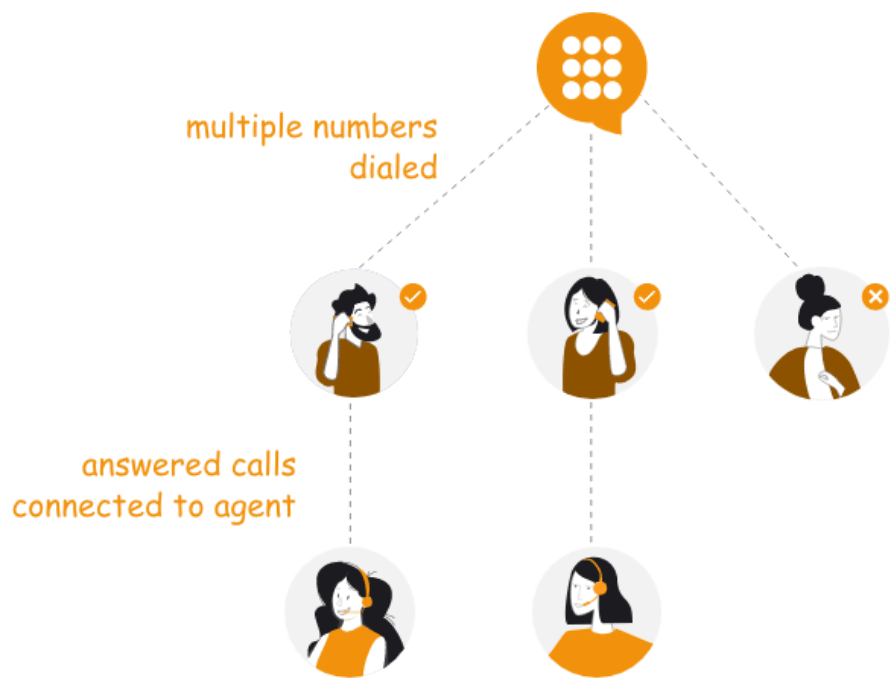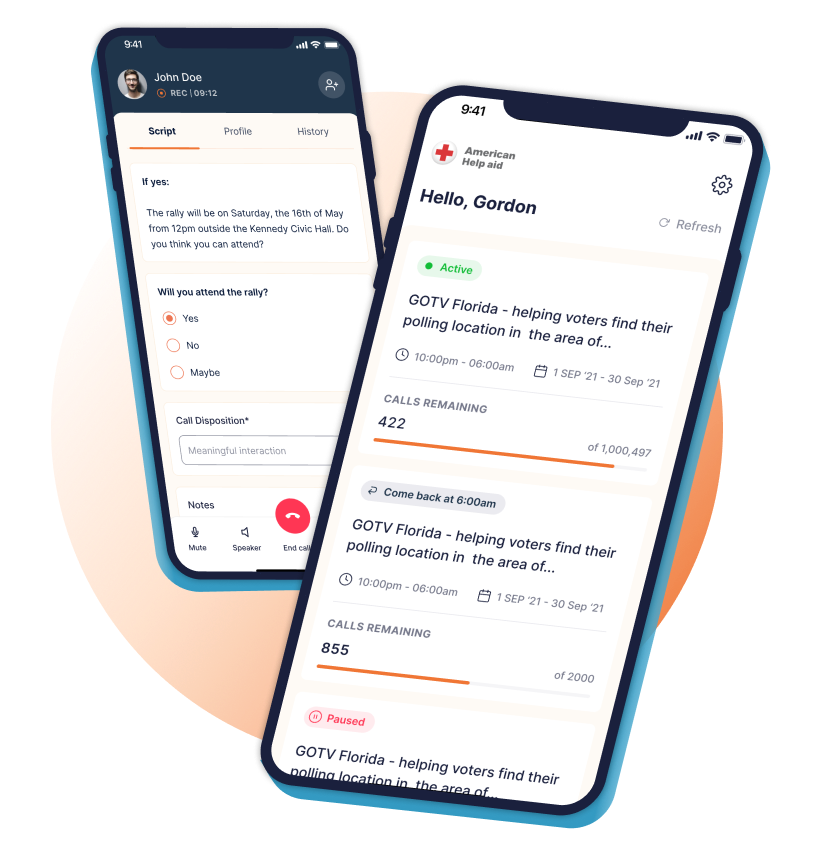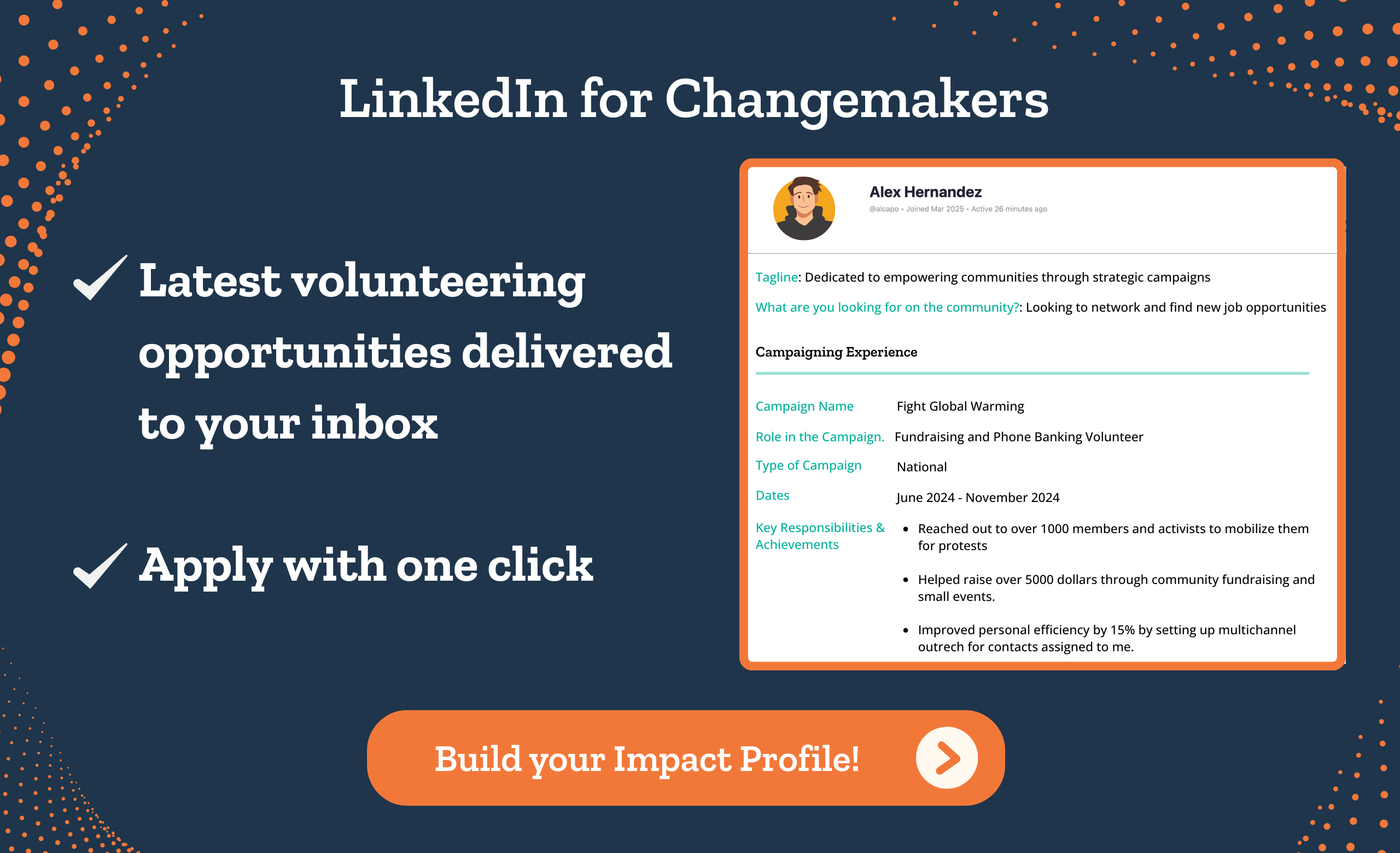Table of Contents
The Telephone Consumer Protection Act (TCPA) adopted a “narrow” definition of auto dialers in 2022, making remarkable changes in the industry perception.
According to this latest definition, an auto dialer is equipment that
- Has the capacity to store telephone numbers using a random or sequential number generator (RoSNG) OR
- Can produce telephone numbers using a random or sequential number generator.
Essentially, a system qualifies as an auto dialer only if it uses a random or sequential number generator.
Does TCPA’s narrow definition affect the use of auto dialers?
This changed definition alters the way one perceives and uses automated call center Vs. Manual collective calling.
Earlier, an automated call center software was a system that called all numbers on the contact lists in one of the following ways:
- A sequence or
- A random order, and
According to the rules set by the campaign manager (e.g., the dial rate, call dispositions, etc.)
However, TCPA requires consent from mobile numbers for someone to call them using an automated call center system lawfully. What about the mobile numbers that hadn’t consented yet?
Enter the manual collective calling—this system used human intervention to click on numbers to initiate dialing. However, the sequencing of the numbers was still done by the system (or equipment).
All this was true before the new definition came into being.
Does this mean the automated call center Vs. Manual collective calling debate has changed? Yes, for now.
Does it mean automated call center systems are now unusable or that manual collective calling is redundant? No, to both.
CallHub evolves as TCPA regulations do, and we work hard to update our tools, so your campaigns run without any major hiccups.
In this article, let’s go through the latest definitions of automated call center Vs. Manual collective calling and see which dialers you should choose for which type of campaign.
Automated call center software
According to the legal definition of an auto dialer, its defining feature is “the capacity to use a random or sequential number generator to either store or produce phone numbers to be called.” (Facebook, Inc. V. Duguid et al.)
By this definition, CallHub’s dialers are safe from scrutiny since we do not and cannot have the capacity to generate random or sequential phone numbers or use a RoSNG to store generated numbers. Our dialers use the sequence on the contact list CSV or the sequence imported from your database.
Note: For clarification, I will call our dialers automated call center software/tool in this article. “Auto dialers” will be reserved for the latest and current definition as understood by the TCPA.
How can you use CallHub’s automated call center?
Political campaigns, nonprofits, advocacy groups, and businesses use automated call center software for various use cases that demand different dialing processes.
For instance, a fundraising campaign requires agents to reach every contact on the list and have meaningful, long conversations. On the other hand, a GOTV calling campaign needs you to go through the entire contact list at a rapid speed.
Keeping such scenarios in mind, CallHub offers three types of automated call center tools.
Read Next: 12 Essential Auto Dialer Features That Make Your Job Easy
CallHub’s call center tools
Predictive Dialer: Best used for high-volume calling like GOTV campaigns or last-minute reminders. The Predictive dialer uses an algorithm that studies answer rate, dropped calls, and other aspects of your live campaign and adjusts the dial rate accordingly.
It calls contacts ahead of time and connects answered calls with available agents. This way, agents spend time only speaking with contacts, and you get through the list three times faster than other dialers.

Power Dialer: The Power Dialer is designed for relatively slow campaigns where reaching every contact is more important than getting through the list.
In these scenarios, like a fundraising or a voter persuasion campaign, every contact is highly valued and agents must spend enough time speaking with each. The Power dialer dials the next number only when an agent indicates they are ready for the call. For instance, an agent will add notes and tags after every call and then click on the next contact. All notes and updates get synced with your database.
Auto Dialer (not by definition but by name): Our auto dialing system is similar to the Predictive dialer in the speed of execution.
The main differences that set them both apart are
- The campaign manager sets the dial rate for agents in an auto dialer (e.g., 3 numbers dialed every time an agent gets free), and
- The Predictive dialer is best used when you have at least 8 active agents (to avoid long gaps between answer time and connecting with an agent).
You can use the auto dialing system for the same use cases as the Predictive dialer, but when your answer rate is poor and/or you have fewer than 8 agents.
CallHub also offers a Robo dialer. But the rules for robocalling are more stringent and can vary from mandates for auto dialers. For a breakdown, you can refer to our article about robocalling laws (for political use cases). Alternatively, you can explore our robocalling tool here.
What’s New: Agents can now use CallHub on their phones! We have launched our mobile app that gets campaigns right in the hands of your agents. Expect more active agents, more time on campaigns, and agents joining more campaigns with this new launch.

Manual Dialer aka Collective Calling
The earlier definition of an auto dialer or the “broad” definition described an auto dialer as equipment that could store and dial numbers. On that front, the dialers I described earlier came under the “auto dialer” category.
Organizers (apart from political campaigns) could not use those dialers to call mobile numbers that hadn’t given consent yet. To counter that and enable smooth calling for campaign managers, we introduced the Fastclick dialer—a manual dialer tool that used human intervention for calls.
One “clicker” agent was responsible for clicking on numbers in a queue to initiate calls. “Talking” agents still had the same job of speaking on connected calls.
However, the sequence of the contacts was still done by the system. That suited the Footnote 7 argument that states that “an auto dialer might use a random number generator to determine the order in which to pick phone numbers from a pre-produced list. It would then store those numbers to be dialed at a later time.”
We have tweaked our manual dialer to accommodate the new definition and Footnote 7.
We replaced human intervention with human selection. Your “clicking” agent will now be your “selecting” agent, and they will select numbers to dial next—essentially creating the sort order themselves. The system will not create this order.
Additional protections
CallHub offers additional protective measures to keep you safe during your call campaigning phases.
- We own the source code for the calling tools from end to end.
We write our own code for the calling tools and do not use 3rd party vendors to build the system. While working with 3rd party vendors works for some of our competitors, it does not provide reliable clarity on the use of RoSNG in the source code.
But the law goes into such details, compromising the security of people conducting campaigns. Since all our code is built in-house, we can safely tell you that we do not use RoSNG.
- Built-in TCPA litigator scrubs.
CallHub has partnered with dnc.com to filter out or “scrub” known TCPA litigators, lawyers, and their families from your lists.
The litigator scrub is an easy and sure-shot way to save your campaigns from serial plaintiffs and “lawsuit mill” litigators who entrap companies by filing lawsuits (often frivolous) for TCPA violations.
Where would you use collective calling over automated dialing?
Collective calling or manual dialing requires one additional step in the rapid-calling process but still ensures you reach more people per minute than dialing manually. Here are some scenarios you should consider using a manual dialer over auto dialers:
- If you currently use auto dialers as defined by the courts. Switch to CallHub’s manual dialers for a TCPA compliant outreach campaign.
- If your contact list contains mobile numbers that haven’t given consent.
- If your contact list contains a mix of mobile numbers and landline numbers.
Where would you use automated dialing over a manual dialer?
It is safe to use auto dialers over a manual dialer or an automated dialing system in the following scenarios:
- If the laws in your state or country do not mandate consent before cold calling numbers.
- If your laws do not define auto dialers according to the RoSNG rules.
- If all numbers in your contact list are landline numbers.
- If all numbers in your contact list have definitely confirmed consent for calling.
We would still recommend going for an automated dialing system, like CallHub’s, that does the job of an auto dialer but currently does not fall under the TCPA definition. This way, you get the advantages of fast calling without falling into the traps of unlawful calls.
The way forward
The laws that define automated call center Vs. Manual collective calling are tricky. There’s more nuance than the scope of this article.
Additionally, the laws keep updating, and while we strive to evolve our tools and update our informational content around it, there could be some risky gaps between the two instances.
For the most up-to-date information and advice on how to stay compliant with your calling campaigns, we suggest you connect with our team of experts. That way, you can get all your doubts sorted in the most updated way. Schedule a meeting with our experts here.

